Trump supporter shot dead during clash with Black Lives Matter protesters in US
A man has been shot dead in the US as supporters of President Donald Trump and Black Lives Matter protesters clashed amid escalating violence in Portland.
Leaders
Don't miss out on the headlines from Leaders. Followed categories will be added to My News.
A man has been shot dead in the protest-hit US city of Portland, police said on Sunday (local time), during clashes between Black Lives Matter activists and supporters of US President Donald Trump.
Police said they had opened a homicide investigation after the victim was hit in the chest as gunfire broke out on Saturday night in the Oregon city, an epicentre of near nightly demonstrations for three months.
The man killed after Portland protesters clashed with Trump supporters was a backer of the right-wing group Patriot Prayer, it was reported on Sunday (local time).
Joey Gibson, head of the Washington state group, also described the dead man as a “good friend,” according to Fox News.
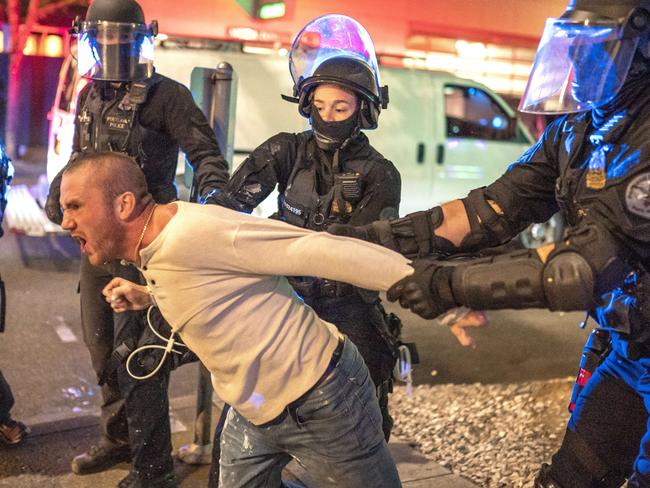
A freelance photographer who was in the area where the shooting took place said the man who was shot was wearing a Patriot Prayer hat.
The group has clashed with Portland Black Lives Matters protesters in the past.
Gibson arrived at the shooting scene shortly after it happened and was briefly corralled in a nearby gas station by angry protesters, according to reports.
“I can’t say much right now. All I can do is verify that he was a good friend and a supporter of Patriot Prayer,” Gibson told reporters.
Meanwhile, Mr Trump blasted Portland Mayor Ted Wheeler with a string of tweets and retweets regarding the ongoing protests and violence in the city.
In the aftermath of a clash between Black Lives Matter protesters and Trump supporters that left one person dead, Trump railed against Wheeler for openly refusing help from the National Guard.
“Wheeler is incompetent, much like Sleepy Joe Biden,” Mr Trump tweeted.
“This is not what our great Country wants. They want Safety & Security, and do NOT want to Defund our Police!”
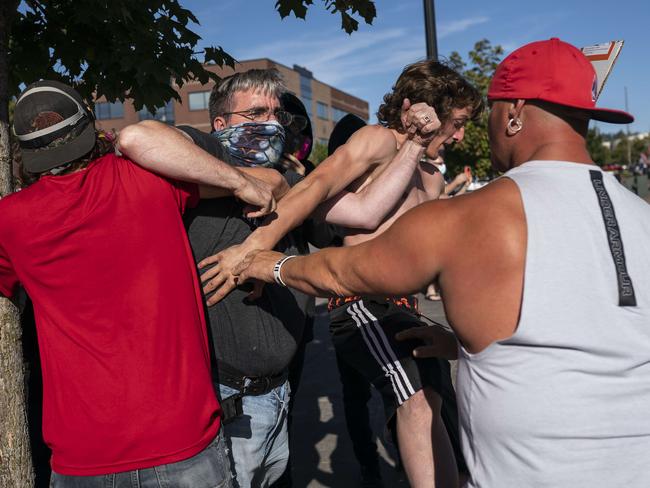
Minutes earlier, the president had tweeted that the “National Guard could solve these problems in less than 1 hour. Local authorities must ask before it is too late.”
The shooting followed a week of nationwide protest — including the cancellation of numerous sporting events — over the police shooting in Kenosha, Wisconsin of black man, Jacob Blake.
Officers answered reports of gunfire as violence erupted during a pro-Trump rally involving hundreds of vehicles “caravanning throughout downtown Portland.”
“They responded and located a victim with a gunshot wound to the chest. Medical responded and determined that the victim was deceased,” Portland Police said in a statement.
OregonLive reported “clashes” and “tense moments” between demonstrators and counter-protesters, although police did not say whether the shooting, around 8:45pm (1:45pm AEST), was connected to the rally.
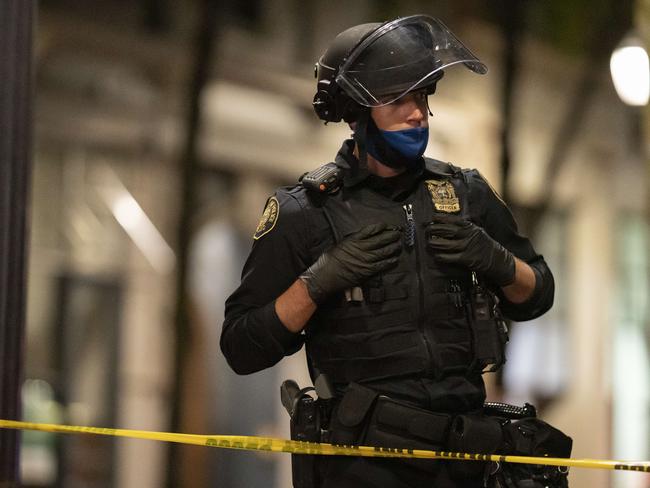
Photographs from the scene showed the victim wearing a hat with a logo for “Patriot Prayer,” described by local media as a far-right group at the centre of multiple Portland demonstrations that have ended in violence.
Police said they made 10 arrests, although they didn’t specify whether the detainees were pro-Trump demonstrators or counter-protesters.
The Portland clashes followed unrest in Kenosha, Wisconsin, where prosecutors accused 17-year-old Kyle Rittenhouse of shooting dead two men and wounding another who were protesting against Blake’s shooting.
SIX FACTORS THAT COULD CHANGE US ELECTION RESULT
The unrest comes just 65 days out from the election, which both sides are calling the most important presidential election in US history.
After lagging behind his Democrat challenger for the past two months, polls show President Donald Trump is slowly closing the gap.
While anything can, and let’s face it, probably will happen to up-end the race again, here’s what you need to know about November’s US presidential election.
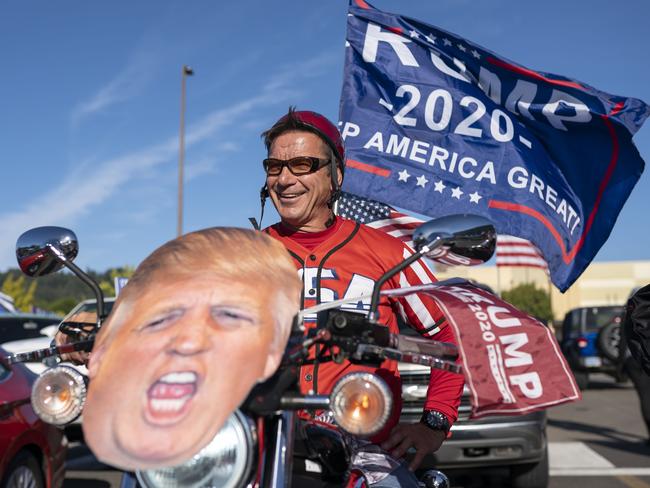
WILL BLACK LIVES MATTER BE A FACTOR?
When Black Lives Matter protesters surrounded Trump supporters leaving the White House this week, screaming at them and assaulting a Senator and his wife, the instantly viral videos could not have been better timed for the president’s re-election campaign.
The mayhem perfectly summed up everything speakers at the Republican National Convention spent last week warning Americans about: radical left mobs are coming for you, and they will tear you down if you don’t bend to their will.
As violent unrest continues in many cities, it increasingly appears that BLM protests will be not just one of the election’s biggest issues, but perhaps the subject that swings the all-important moderate vote Trump’s way.
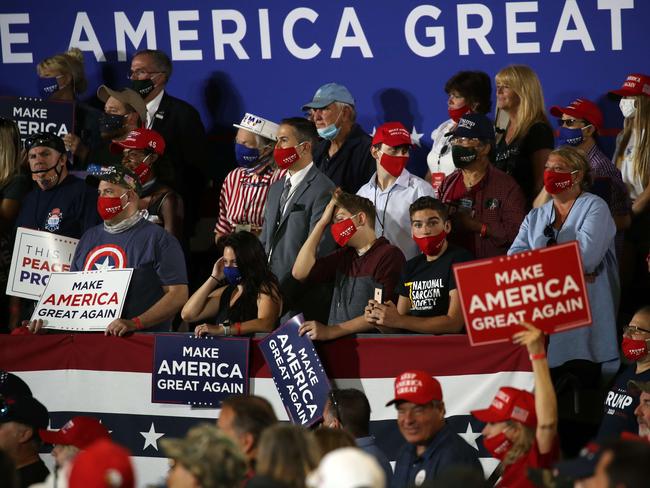
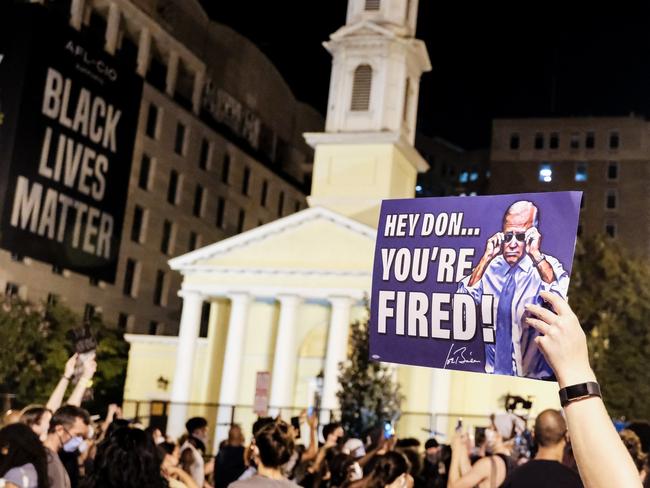
Republicans are increasingly framing this as a law and order election, repeating much of the messaging that swept Nixon into power in 1968.
“The hard truth is you won‘t be safe in Joe Biden’s America,” said both Trump and Vice President Mike Pence last week.
Of course, Nixon was the challenger, offering respite from the roiling chaos of the 1960s, but while Trump is the incumbent, he is laying the blame for out-of-control demonstrations at the feet of the Democrat mayors and governors in charge in Portland, New York, Chicago and Washington DC.
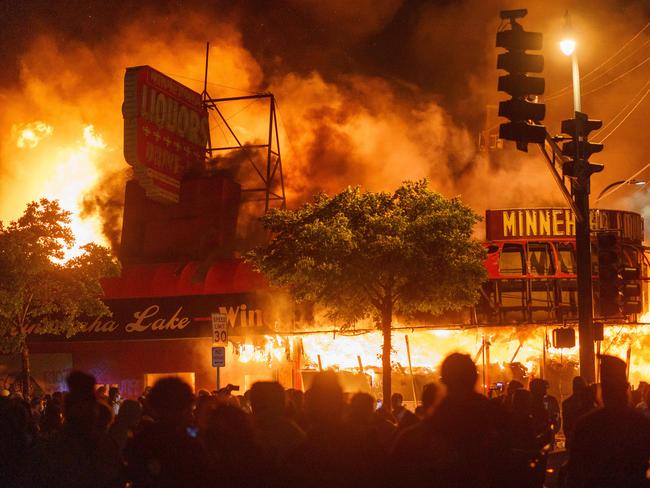
IN 2016 THE POLLS WERE WRONG. CAN WE TRUST THEM THIS TIME?
While Donald Trump’s win four years ago was a bombshell that sparked widespread doubt about the future of polling, a lot of pundits weren’t that far off.
Most predicted Hillary Clinton would win the popular vote, which she did by almost three million votes, and that it would be close in several swing states.
It was through a narrow victory in these states that Republicans took the electoral college and gave Trump the White House.
Polls had predicted a Clinton victory in almost all of this year’s six key battleground states — Wisconsin, Michigan, Pennsylvania, North Carolina, Florida and Ohio — all of which went red.
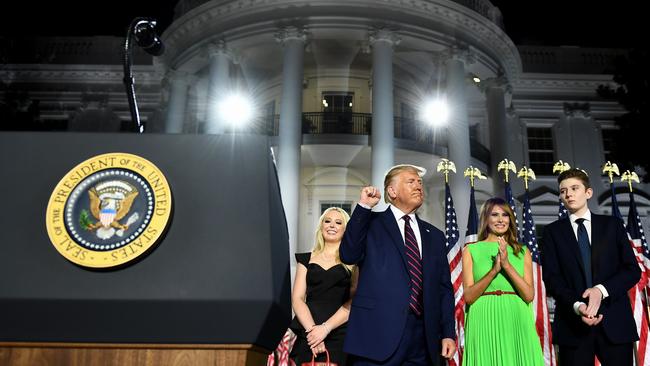
Another issue was that polling didn’t continue until the final weeks of the campaign in 2016, so the late swing to Trump wasn’t reflected.
Polling outfits say they have finetuned their processes to avoid these issues.
“Pollsters don’t always get it wrong,” says Professor Joseph Campbell of American University.
“They get it wrong often enough for us to be wary about the results, but it’s not the case that polls inevitably are going to be in error. I just think we should treat them with caution, with a degree of scepticism.”
Changing technology was also an issue, with many homes not even having landlines, which are the only way for automated polling to take place.
This is one area where COVID-19 may actually have a slight benefit in terms of accuracy, given how much time people are spending in their homes.
“Since they’re home and want to do something different, they’re more inclined to pick up the phone and answer a pollster’s inquiry than they would otherwise,” says Prof Campbell.
Mobile phones are only called by human questioners and these calls have been boosted by polling companies this year.
IS TRUMP'S SECRET SUPPORTER BASE STILL A THING?
Another reason Donald Trump’s 2016 victory blindsided so many was the phenomenon of his hidden supporters.
Many of these were moderates who had voted for Obama but were not convinced by the Clinton campaign.
Others were those who knew better than to admit publicly they supported the divisive Trump.
It’s hard to put a number on the impact this year because they are, well, secret, but there is broad anecdotal evidence to support their continued strong presence.
A quick glance at cable news ratings, where the conservative Fox News easily outranks left-leaning CNN and MSNBC and has topped the prime time ratings for the past eight months, offers some idea of what Middle America is watching.
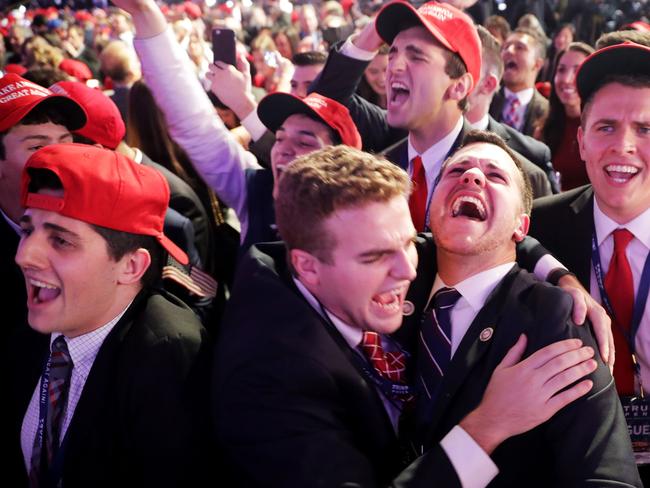
American University’s Professor Joseph Campbell says some pollsters dispute their existence but he believes the “shy trump vote” was a factor in the last election.
He describes them as: “people (who) for socially desirable reasons, would not tell pollsters that they were supporting Donald Trump, even when privately they were”.
“It could be that even now, four years into his presidency that there could be people out there who are not going to tell pollsters or even openly say that they’re going to be supporting Trump,” he says.
“There’s the potential, if not strong potential, for a shy Trump vote in 2020. And if that’s the case, then it’s really going to be a difficult election to forecast; a difficult election to predict.”
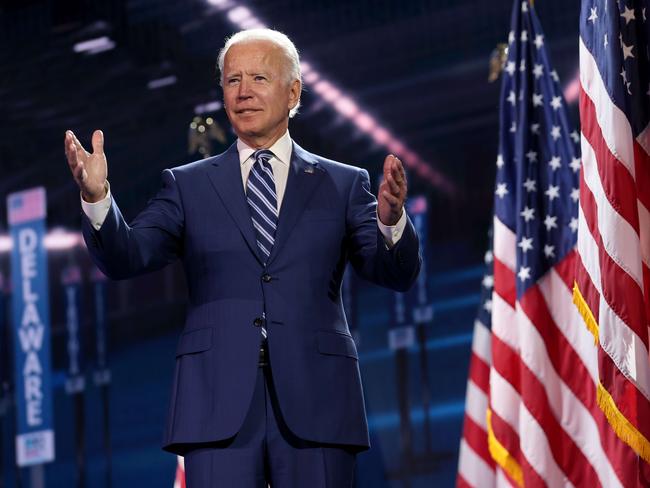
WILL JOE BIDEN'S AGE TURN OFF PROSPECTIVE VOTERS?
When Donald Trump won in 2016 aged 70, he was the oldest person to assume the office of president.
Joe Biden is 77 and would be 78 at the 2021 January inauguration, and his advanced years are the biggest issue registered voters have with him.
Almost a third said Biden’s age and health were worrying, which is a bigger slice of the population than who felt negatively about Trump’s personality (25 per cent), according to Pew Research released this month.
Trump campaign attack ads repeatedly portray Biden as senile or suffering from declining mental acuity. But to be fair, Trump’s detractors have been saying the same thing about him for years.
This issue is absolutely at the forefront of many voters’ minds and the presidential debates, which start at the end of September, are seen as the first real opportunity for punters to judge both candidates for themselves.
WILL KAMALA HARRIS' STATURE AS A BLACK WOMAN INFLUENCE VOTERS?
When white Senator Amy Klobuchar withdrew from the race to become Joe Biden’s running mate, she said the race protests in her home state of Minnesota after the killing of George Floyd were part of her decision.
“After what I’ve seen in my state, what I’ve seen across the country, this is a historic moment and America must seize on this moment,” she said in June.
“This is a moment to put a woman of colour on that ticket.”
Kamala Harris, whose parents came from Jamaica and India, made history this month when she became Biden’s pick, as the first black and South Asian on a main party’s presidential ticket.
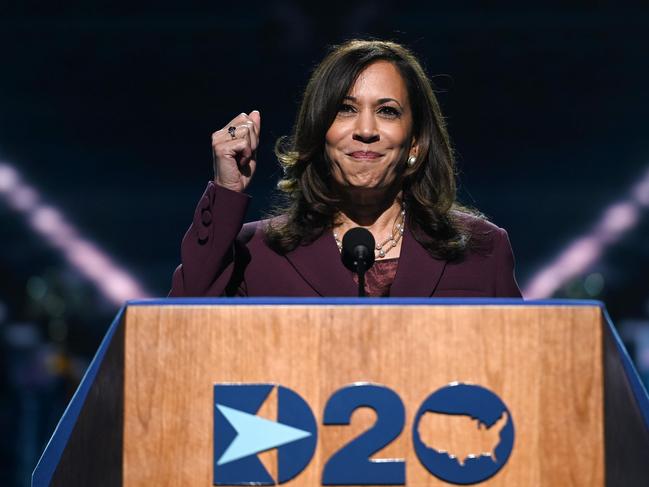
Historically, vice presidents don’t have much sway on who Americans choose to support, but there are many who believe this year could be different because of Biden’s age and the fact he has not publicly committed to seeking a second term.
Certainly one tactic Republicans are increasingly turning to is to paint Biden as a straw man and Trump’s actual opposition as Harris.
Biden, who is seen favourably by black voters for his eight years serving as Barack Obama’s deputy, already heavily outpolls Trump within these communities.
But where the main impact could come would be in an enthusiasm bump, which will be vital for Democrats angling to improve on the seven per cent reduction in turnout from black voters in 2016.
“I think Senator Harris provides that bump in terms of enthusiasm, which is critical for securing the black vote,” said Quentin James, who runs a political committee to elect black candidates.
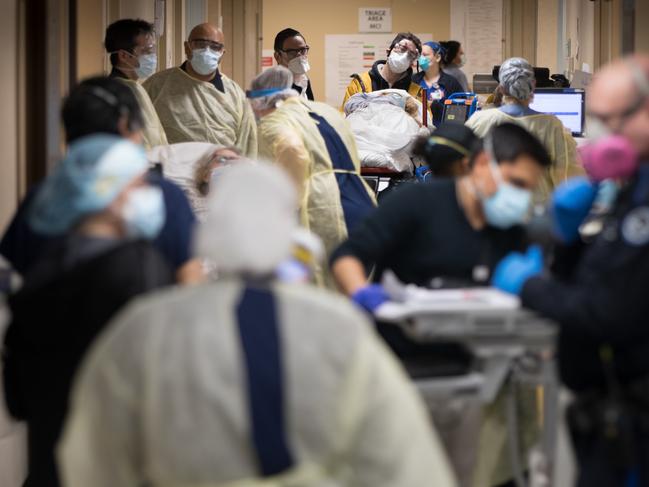
WILL COVID CONCERNS AFFECT VOTER TURNOUT?
This is the biggest question for 2020, with the pandemic changing almost everything about the presidential race.
Most campaigning has moved online and turnout was down in some primary races earlier this year because of safety concerns.
Opinions about how much the coronavirus should impact how many people actually vote this year tend to be split along party lines.
Donald Trump has been railing against postal votes — which traditionally favour Democrats — for months.
Republicans say if it’s safe to get out and protest, as many on the left are doing, then it’s safe to get out and vote.
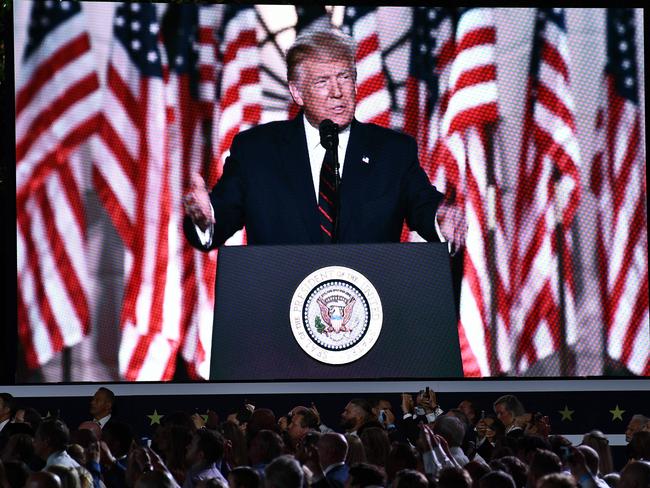
Joe Biden has been far more cautious in terms of COVID, rarely leaving his home to campaign and encouraging supporters to register to vote by mail.
Individual states control the polls in the US and there are myriad rules and regulations that make a uniform approach impossible.
All this makes it very likely an election result won’t be known on the night and that any verdict will be challenged on multiple legal fronts.
“I think they will have a legal stoush, but it‘s not something that’s going to go on for six or seven weeks,” says Simon Jackman from the United States Study Centre at Sydney University.
“It‘s more likely to go on two to three or four weeks.”
Professor Campbell says it could be similar to the 2000 election, when a winner between George W. Bush and Al Gore was decided 37 days after the polls closed because of a recount in Florida.
“The country has gone through those ordeals in the past, not that they’re pleasant or not that they should be looked forward to,” he said.
“There is some history of waiting and going past Election Day to know who has won.”
MORE NEWS
Trump slams ‘destroyer’ Biden in acceptance speech
The divided US state Biden must take from Trump
Why these National Conventions are like no other
First Ladies: America’s secret weapons
– with AFP
Originally published as Trump supporter shot dead during clash with Black Lives Matter protesters in US
